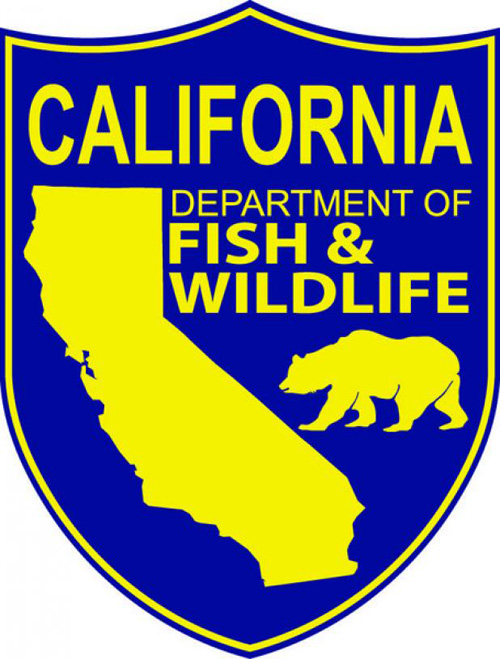
Your Source for Outdoor Adventure
Northern California and Southern Oregon
California Outdoors Q & A: What to Do With Injured Wildlife?
by Carrie Wilson
3-3-2011
Website

Answer: In saltwater, you can use as many lines as you can handle, with some exceptions. On public piers, only two fishing appliances (lines, rods, traps, hoop nets, etc.) are allowed. When fishing for rockfish, lingcod, salmon and some other species, the number of lines you can use is limited (see individual species' regulations for details). When fishing in San Francisco Bay, only one line may be used (and three hooks, maximum). See Section 28.65 in the current Ocean Sport Fishing regulations booklet for more information.
Question: We have seen an injured buck in our neighborhood with a gash in his left hind leg and bone sticking out. It's swollen, probably infected and he can't put any weight on that leg at all. I don't see how it will get better and he doesn't seem to have much to look forward to other than a lot of suffering and a painful death. He needs to either be given a fighting chance by tranquilizing and treating him or to be put out of his misery so this injury won't fester and cause him to suffer anymore. Is there anything someone can do? (Jennifer P., Pacific Grove)
Answer: There are wildlife rehabilitation facilities that are able to help fawns in some situations, but for safety reasons they cannot possess or take in adult deer. According to Nicole Carion, DFG's statewide coordinator for wildlife rehabilitation and restricted species, adult deer can be very dangerous and do not fare well in captivity to undergo medical treatment, so a rescue is not a good option. In this particular case, it sounds like humane euthanasia may be the best solution. Unfortunately, the Department of Fish and Game (DFG) does not have the manpower to respond to most injured wild animal calls. You should still report injured wildlife to your local DFG office. If there is someone who can respond, they will do so. The DFG may also be able to coordinate with local animal control to help an injured animal. It's best to leave wildlife alone though, for safety reasons and because human interference in most cases is not beneficial. This buck may succumb to his injuries, but there are many times when deer can survive severe injuries; they just need time to heal. Thank you for caring about wildlife. For more information on what to do about sick or injured wildlife, please see the DFG website at www.dfg.ca.gov/LivingWithWildlife
Question: I have some questions about a new crew cab style pickup out this season that includes a pair of built-in locking storage lockers under the rear seats that can be used to store firearms. My questions are: 1) Would dual storage lockers, separated by a divider that must be unlocked on both sides before it can be removed, satisfy the storage and transport requirements of California law, providing of course the gun is transported empty and the ammo is kept separately in the other compartment? 2) In the case of long guns, if the two compartments are linked by pulling out the divider, would the owner then have to store ammo somewhere else? The only other locking storage compartment would be the glove compartment or maybe center console storage, but that is within reach of the driver. (Matt E., Sacramento)
Answer: A concealable firearm is defined as a pistol, revolver or firearm with a barrel less than 16 inches (Penal Code, Section 12001 (a)). Concealable firearms are prohibited in a vehicle whether they are loaded or not (PC, Section 12025 (a)(1)). However, concealable firearms may be carried in a motor vehicle provided they are locked in the vehicle's trunk or in a locked container in the vehicle other than the utility or glove compartment (PC, Section 12026.1 (a)(1)). There are some exceptions to this. For instance, when engaging in, going to or returning from a hunting or fishing expedition, licensed hunters and fishermen may lawfully carry an unloaded concealable firearm anywhere in their vehicle (PC, Section 12027 (g)). According to DFG Lt. Scott Melvin, because these particular under-the-seat lockers are new, there is yet no case law that specifically addresses them. In the future, the court may interpret these lockers as falling outside the description of utility or glove compartments as described in PC, Section 12026.1 (a)(1), thus allowing people to carry handguns there. But until then, the new storage lockers should be considered utility or glove compartments. As for carrying long guns in under-the-seat storage lockers, there is nothing prohibiting someone from carrying an unloaded rifle or shotgun with a barrel 16 inches or longer in their vehicle. If the magazine is not attached to the rifle (and there is not an unexpended cartridge in the firing chamber), the rifle is unloaded. It doesn't matter how close the rifle and magazine are to each other.
Carrie Wilson is a marine environmental scientist with the California Department of Fish and Wildlife. While she cannot personally answer everyone’s questions, she will select a few to answer each week in this column. Please contact her at CalOutdoors@wildlife.ca.gov.
MyOutdoorBuddy.com © 2025. All Rights Reserved.
Website Hosting and Design provided by TECK.net
Website Hosting and Design provided by TECK.net